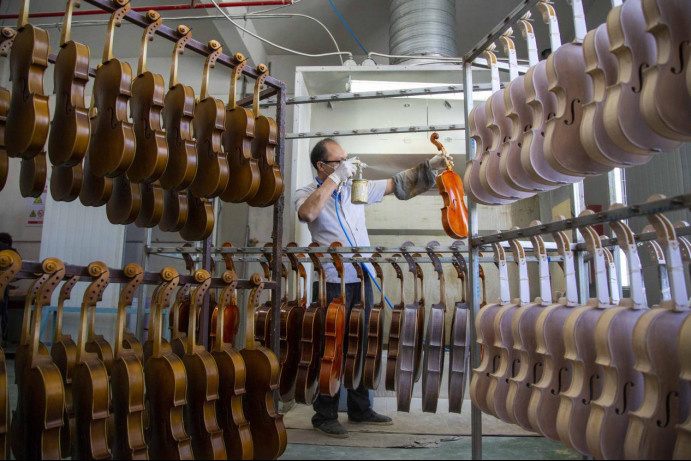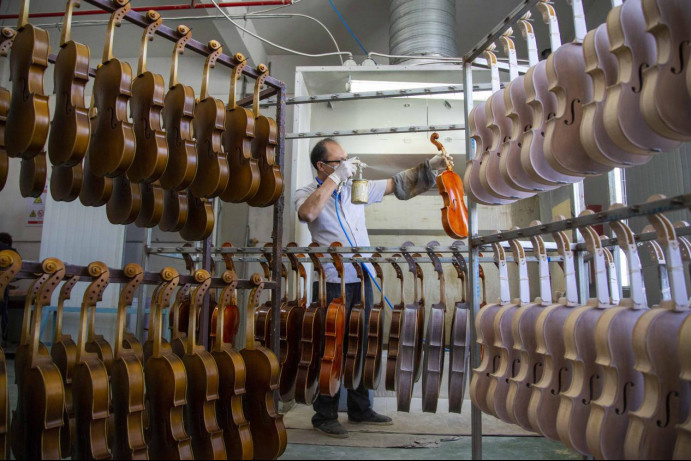By Wang Hanchao, Bai Guangdi, People's Daily

A worker of Finelegend in Huangqiao township, Taixing, east China's Jiangsu province spray-paints a violin. (Photo by Tang Dehong/People's Daily Online)
When farmers in Huangqiao township learned to carve the very first batch of violin scrolls 60 years ago, no one was expecting that the small township in Taixing, east China's Jiangsu province would become a globally renowned manufacturing center of the stringed instrument.
Today, the township, though a latecomer to development, accounts for 70 percent of China's violin production and over half of the world's. Besides, it also produces around 700,000 guitars annually.
There are over 230 enterprises in the township engaged in violin manufacturing, and more than 30,000 people out of the township's 200,000 residents are working in the industry.
The township's history of violin making started with two former workers of the Shanghai Violin Factory, who returned to their hometown Huangqiao in 1962 and taught locals the skills of scroll carving - the basics of violin manufacturing.
The unplanned craft grew into a business. In 1971, an instrument factory was established in a township near Huangqiao to supply violin parts for manufacturers in Shanghai. Fourteen years later, the factory became a branch of the Shanghai Violin Factory, and the two signed a 10-year contract.
Li Shu, then manager of the factory, went to Frankfurt, Germany in 1992 for an international musical instrument exposition, where he found a big gap between his factory and its global peers. Therefore, he brought home violins made in Germany, Japan and South Korea and showed these foreign products to his employees, in the hope to improve the quality of their own products.
When he attended another exposition, he confidently introduced his violins to various producers and offered a competitive price of $15 for each violin. The appearance of the Huangqiao violin left a deep impression on the international instrument market.
In 1995, the 10-year deal with Shanghai Violin Factory expired and the factory started soaring. In that year, the factory made over 60,000 violins independently, outpacing some of the best violin manufacturers in Shanghai and Guangzhou to become the largest violin manufacturer in China.
Also in that year, the factory embraced a new opportunity by establishing a joint venture Finelegend with American company AXL Beats Instrumentals.
The cooperation straightened the sales channel. Over half of Finelegend's products are sold to the European and American markets through AXL Beats Instrumentals. In addition, the international industrial standards are also brought to Finelegend through the American company.
Thanks to reliable quality and favorable prices, violins produced in Huangqiao township are welcomed by the international market. At the peak of its production capacity, Finelegend had over 1,100 employees and could produce more than 300,000 violins in a year. The joint venture nurtured more than 60 managers of violin factories in Huangqiao township. The township even attracted an enterprise from the UK to establish its factory in Huangqiao.
As violin learning got popular in China, more factories in Huangqiao started making middle- and high-end products for innovative development.
Today, almost every student in Huangqiao's primary schools can play an instrument under the city’s musical influence. So far, over 85 percent of the students in primary and junior high schools in the township have learned to play an instrument, such as gourd flute, ukulele, guitar and violin. Even lobby managers and waiters in a random hotel can establish a mini band. Musical instrument performances are always seen on the street.
The instrument makers in Huangqiao, turning from farmers who knew nothing about music to workers making instruments that are popular around the world, are contributing to the music dreams of the next generation and making instruments more and more common in daily life.
Huangqiao is a major host of the international instruments playing day of China, which falls on every June 21. On this day, local people would play all types of instruments everywhere in the township, together with musicians from all over the world. It has developed into a festival for the township over the past seven years.
"Music will be a rigid demand in the future. We hope that instruments can be as indispensable as furniture in China, so that music would be brought to more and more people," said Li Xiaochen, head of Finelegend.
Today, the township, though a latecomer to development, accounts for 70 percent of China's violin production and over half of the world's. Besides, it also produces around 700,000 guitars annually.
There are over 230 enterprises in the township engaged in violin manufacturing, and more than 30,000 people out of the township's 200,000 residents are working in the industry.
The township's history of violin making started with two former workers of the Shanghai Violin Factory, who returned to their hometown Huangqiao in 1962 and taught locals the skills of scroll carving - the basics of violin manufacturing.
The unplanned craft grew into a business. In 1971, an instrument factory was established in a township near Huangqiao to supply violin parts for manufacturers in Shanghai. Fourteen years later, the factory became a branch of the Shanghai Violin Factory, and the two signed a 10-year contract.
Li Shu, then manager of the factory, went to Frankfurt, Germany in 1992 for an international musical instrument exposition, where he found a big gap between his factory and its global peers. Therefore, he brought home violins made in Germany, Japan and South Korea and showed these foreign products to his employees, in the hope to improve the quality of their own products.
When he attended another exposition, he confidently introduced his violins to various producers and offered a competitive price of $15 for each violin. The appearance of the Huangqiao violin left a deep impression on the international instrument market.
In 1995, the 10-year deal with Shanghai Violin Factory expired and the factory started soaring. In that year, the factory made over 60,000 violins independently, outpacing some of the best violin manufacturers in Shanghai and Guangzhou to become the largest violin manufacturer in China.
Also in that year, the factory embraced a new opportunity by establishing a joint venture Finelegend with American company AXL Beats Instrumentals.
The cooperation straightened the sales channel. Over half of Finelegend's products are sold to the European and American markets through AXL Beats Instrumentals. In addition, the international industrial standards are also brought to Finelegend through the American company.
Thanks to reliable quality and favorable prices, violins produced in Huangqiao township are welcomed by the international market. At the peak of its production capacity, Finelegend had over 1,100 employees and could produce more than 300,000 violins in a year. The joint venture nurtured more than 60 managers of violin factories in Huangqiao township. The township even attracted an enterprise from the UK to establish its factory in Huangqiao.
As violin learning got popular in China, more factories in Huangqiao started making middle- and high-end products for innovative development.
Today, almost every student in Huangqiao's primary schools can play an instrument under the city’s musical influence. So far, over 85 percent of the students in primary and junior high schools in the township have learned to play an instrument, such as gourd flute, ukulele, guitar and violin. Even lobby managers and waiters in a random hotel can establish a mini band. Musical instrument performances are always seen on the street.
The instrument makers in Huangqiao, turning from farmers who knew nothing about music to workers making instruments that are popular around the world, are contributing to the music dreams of the next generation and making instruments more and more common in daily life.
Huangqiao is a major host of the international instruments playing day of China, which falls on every June 21. On this day, local people would play all types of instruments everywhere in the township, together with musicians from all over the world. It has developed into a festival for the township over the past seven years.
"Music will be a rigid demand in the future. We hope that instruments can be as indispensable as furniture in China, so that music would be brought to more and more people," said Li Xiaochen, head of Finelegend.
 Menu
Menu
 Township in E China turns into globally renowned violin manufacturing center
Township in E China turns into globally renowned violin manufacturing center
















